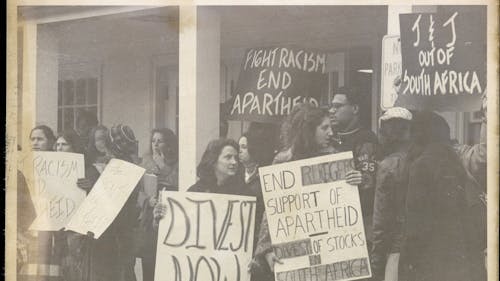COMMENTARY: Legacy of divestment effort at Rutgers

In 1984, the Rutgers Coalition for Total Divestment (RCTD) was formed in response to Rutgers' ties with South African apartheid. The RCTD emerged as a powerful voice of moral conscience on campus. Angered by Rutgers' refusal to abide by the Sullivan Principles that called to boycott racist South African companies, RCTD mobilized students, faculty and alumni. Their aim? To press Rutgers and New Jersey to divest from apartheid-complicit businesses.
From 1977 to 1985, RCTD's divestment campaign included a large rally, a sit-in at the College Avenue Student Center and a hunger strike. The organization initiated an educational program on apartheid, taught in dorms and rallied faculty support. Notable events featured a rally with more than 4,500 supporters and a national sleep-in for apartheid, culminating in a rally and funeral march, echoing the global call for justice.
Due to RCTD's collective efforts, Rutgers ultimately agreed to fully divest from companies dealing with South Africa. It should be noted that this divestment was worth $6.4 million in 1985, not accounting for inflation.
RCTD's historic victory inspires our current struggle for ethical investment. The Endowment Justice Collective (EJC) was founded in 2019 in RCTD's footprints, calling for Rutgers to critically assess its investments in Israeli apartheid, the military-industrial complex, sweatshop labor, fossil fuels and other objectively immoral sectors. EJC's work culminated in the Spring 2020 divestment request titled "Rutgers University: A Case for Ethical Divestment," as previously reported by The Daily Targum.
As a direct result of EJC's divestment request, March 2021 saw the University commit to divest from fossil fuel investments, stating that the endowment fund will:
"1. Cease all new investments in fossil fuels."
"2. Divest from passive index funds with fossil fuel investments within one year and reinvest in more environmentally friendly versions of those indices ..."
"3. Exit all currently held private fossil fuel investments within 10 years."
Unfortunately, Rutgers ignored all other ethical concerns highlighted in the request, betraying the University's mission.
Rutgers has forgotten its legacy of divestment, so our work is not done.
Today, EJC is pressed to make the same demands as RCTD did in 1977 by urging Rutgers to divest from apartheid and destruction, this time on behalf of Palestine and the Palestinian people. We will thoroughly investigate Rutgers' 2023 endowment. We hope you join us in our education and escalation campaign as we create our divestment request.
The Endowment Justice Collective is a student-led coalition of Rutgers students, faculty and community organizations advocating for an ethical University endowment fund.
*Columns, cartoons and letters do not necessarily reflect the views of the Targum Publishing Company or its staff.
YOUR VOICE | The Daily Targum welcomes submissions from all readers. Guest columns and commentaries must be between 600 and 900 words. All authors must include their name, phone number, class year and college affiliation or department to be considered for publication. Please submit via email to oped@dailytargum.com by 4 p.m. to be considered for the following day's publication. Columns, cartoons and letters do not necessarily reflect the views of the Targum Publishing Company or its staff.



